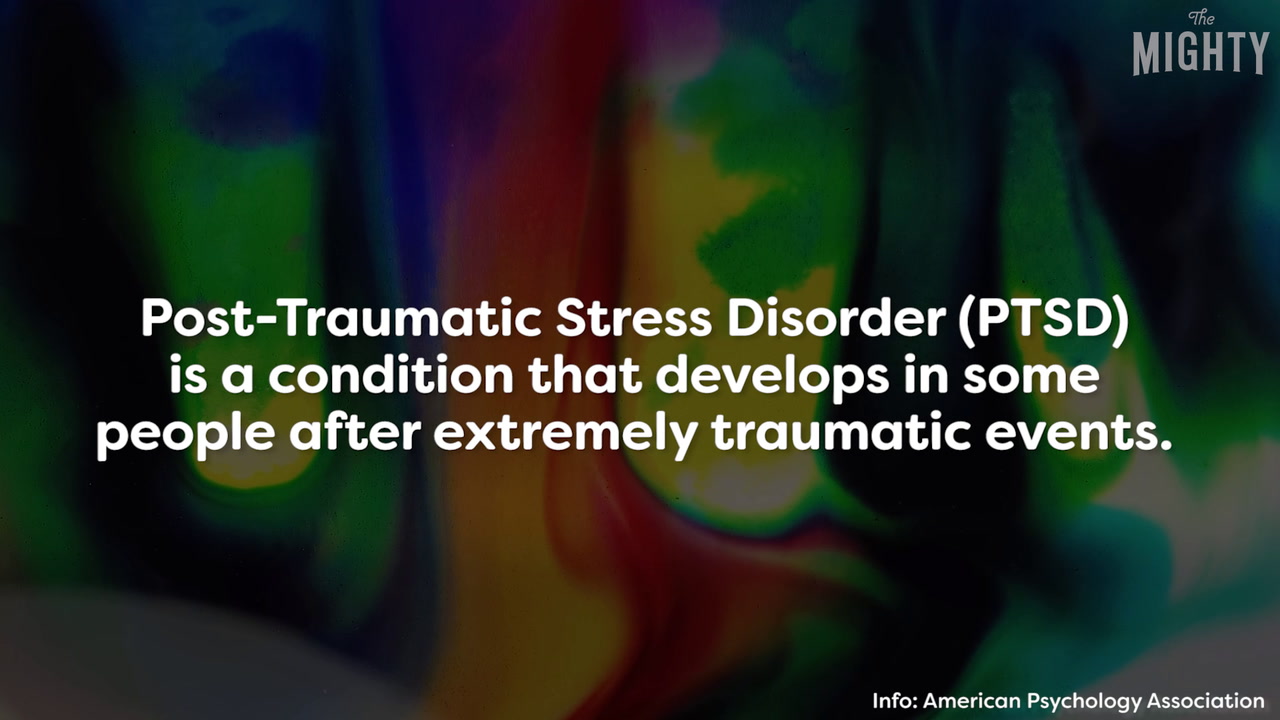Posttraumatic stress disorder (PTSD) is a stigmatized mental illness that is often misunderstood. PTSD can occur after experiencing a traumatic event. Learn what the Mighty community has to say about what PTSD means to them in the video above.

Transcription:
Post-Traumatic Stress Disorder (PTSD) is a condition that develops in some people after extremely traumatic events. (Info: American Psychology Association)
We asked The Mighty’s community members with PTSD to help raise awareness by sharing some information about what PTSD actually is.
What is PTSD?
“It’s being stuck in a moment. It’s more than a memory. It’s feeling what I felt and hearing what I heard and not being able to pull myself back to reality.”
“My PTSD manifests as anxiety/hypervigilance, problems with sleep and nightmares, being triggered by things related to my trauma and issues with trusting people.”
“I experience nightmares, intense anxiety, panic attacks, self-harm, body memories, flashbacks, suicidal ideation and hypervigilance connected to past trauma.”
What isn’t PTSD?
“One of the biggest misconceptions people seem to have is that PTSD symptoms and responses make sense, but they rarely do. Even though I’m no longer in physical danger, the memories of what happened can give me the same fears and feelings. ”
“That we are constantly angry or emotionally volatile. Most people would never know I struggle with PTSD. I’ve learned to hide behind a mask.”
“That it’s not real, that I can’t have PTSD because I’m not a veteran and that I shouldn’t have symptoms anymore because I went to therapy.”
“People love to gatekeep what can and can’t cause PTSD. You can’t tell me what didn’t traumatize me. You weren’t there and you’re not here now as I’m reliving it.”
What types of treatments and support are available for PTSD?
“There are many treatments for PTSD, including talk therapy, Eye Movement Desensitization and Reprocessing Therapy (EMDR), support groups and medication.”
“I’ve learned a lot about PTSD treatment including some types of therapy that are beneficial to people like me who have Complex-PTSD (C-PTSD) due to multiple traumas.”
“It’s important to have good self-soothing resources, I’m a huge Céline Dion fan so I will turn to her music to calm myself down. It’s also crucial to develop a support network.”
What is the best way for someone to support a loved one with PTSD?
“Have patience during their flares and give them time and space they need to process the trauma that led to their PTSD.”
“Emotional support animals are so helpful. Nothing gets me out of a flashback like the touch of my two kitties. Their presence has been indispensable to my recovery.”
“I think it’s important for loved ones to use supportive language, learn what sensory triggers your person deals with and ask them how you can best support them each day.”
Learning the facts and myths about PTSD helps to eliminate the barriers those with PTSD tend to face getting a diagnosis and treatment. There are many types of treatment available for PTSD, talk to your doctor to find a plan that works best for you. Listen to those with lived experience to know the signs and better support the people in your life who may be experiencing PTSD.
To join our PTSD Support Community, click HERE and come join the conversation.

